2012 UEFA European Football Championship
Poland/Ukraine 2012
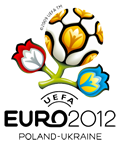 For the first time the European Championship for national teams was played in Eastern Europe. The bid from Poland and Ukraine was chosen from a shortlist by UEFA's Executive Committee in April 2007 in Cardiff and is the third time in succession that a joint bid has been successful. Pending the outcome of trials of goal-line technology, UEFA placed two additional match officials alongside each goal.
For the first time the European Championship for national teams was played in Eastern Europe. The bid from Poland and Ukraine was chosen from a shortlist by UEFA's Executive Committee in April 2007 in Cardiff and is the third time in succession that a joint bid has been successful. Pending the outcome of trials of goal-line technology, UEFA placed two additional match officials alongside each goal.
Six of the eight stadia are brand new. A major challenge for supporters is the sheer distances involved: from Poznan to Donetsk, for example, is 1,784km (1,070 miles) by road.
The big tournaments for national teams have become a platform for the big companies to showcase the best that their designers can produce, with national symbols incorporated into new strips alongside design touches that define their house styles.
This is the last time that 16 teams will contest the finals. From 2016 there will be 24 finalists.
Match by Match Reports: Group A | Group B | Group C | Group D | Knock-Out Stages
Group A
 Poland
Poland
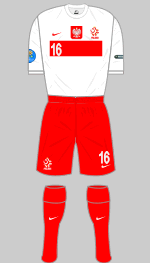
First
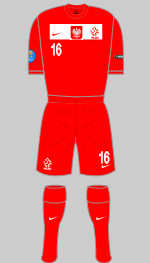
Second
Designer: Nike
The omission of the traditional crowned eagle, the national symbol, from the new kits when they were launched in November caused a furore and the country's president demanded an explanation. Nike bowed quickly to the pressure and introduced an amended version in December with the Orzeł Biały restored.
The new emblem of the Polish Football Football Association (PZPN) that combines the eagle and crown in a stylised way also appears. The away kit was launched with red shorts and socks so we can anticipate that white ones will also be available.
 (Todd Good, Sytse Korts)
(Todd Good, Sytse Korts)
 Greece
Greece
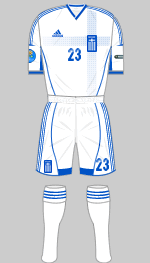
First
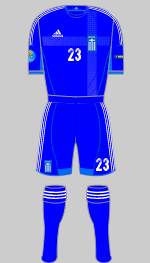
Second
Designer: Adidas
The Greeks maintain the tradition established when they unexpectedly won Euro 2004 with an all-white first choice strip. The latest version has a cross, taken from the national flag, printed into the fabric in a fine mesh pattern. The second choice is a mirror image but adds a second shade of blue to the mix.
 (Robert Brown)
(Robert Brown)
 Russia
Russia
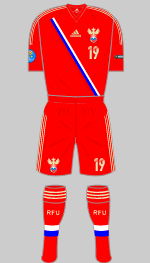
First
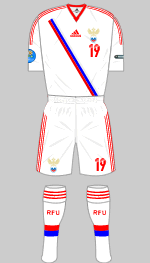
Second
Designer: Adidas
Russia's new first choice strip is all-red with the national tricolour worn as a narrow diagonal band across the front of the shirt. Pale metallic gold trim complements the ensemble rather well. A very fine scalloped pattern is woven into the shirts but this detailing can only be made out at very close range.
The second strip is simply a white version of the first  choice.
choice.
 Czech Republic
Czech Republic
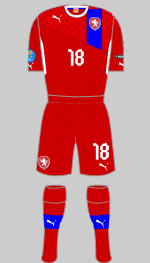
First
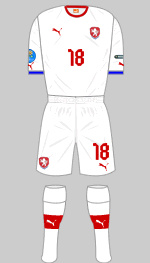
Second
Designer: Puma
The Czechs have broken with tradition, adopting a strip that is all-red (actually "chili red") in place of their usual red/white/blue combination. A new crest is placed on a vertical blue flash on the shirt, which is finished off with a  diagonal checkered motif across the upper body. The white away strip has no such gimmicks.
diagonal checkered motif across the upper body. The white away strip has no such gimmicks.
Group B
 Netherlands
Netherlands
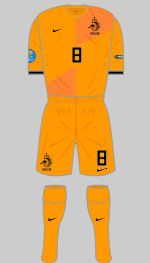
First
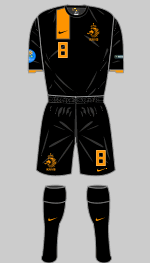
Second
Designer: Nike
Apart from the unusual two-tone effect on the first-choice shirt, the Dutch team's strips are fairly straightforward. The orange flash on the "away" kit is edged with a shiny material that gives the impression it is stuck on with gaffer tape.
 (Rutger Karssing, Sytse Korts)
(Rutger Karssing, Sytse Korts)
 Denmark
Denmark
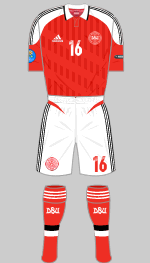
First
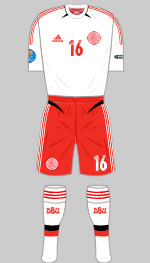
Second
Designer: Adidas
Denmark's first-choice strip features black trimmings and white shoulder flashes, a reference to the Hummel outfit
worn when the team unexpectedly won Euro 92 in Sweden. The 20th anniversary of this achievement is marked by commemorative printing inside the shirt, below the rear of the collar. Adidas' trademark three stripes interrupt the vertical shadow stripes woven into the torso.
 (Ramazan Karsak)
(Ramazan Karsak)
 Germany
Germany
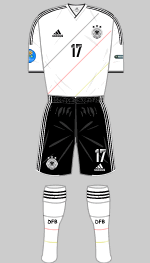
First
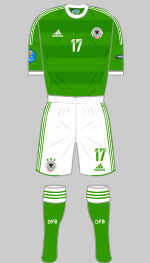
Second
Designer: Adidas
As usual, Adidas' designs for the German national team are outstanding: understated but with just enough subtle detailing to make them memorable. The national colours are now rendered as fine diagonal stripes across the shirt while the new away strip is a re-creation of their famous green and white alternate strip. The detailing inside the collar celebrates 40 years since Die Mannschaft first won the European Championship in 1972.
 (Conor Ritchie)
(Conor Ritchie)
 Portugal
Portugal
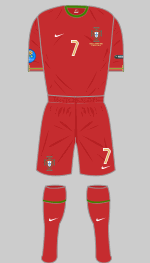
First
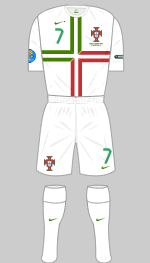
Second
Designer: Nike
The green chest band worn in the 2010 World Cup has been dropped and a slightly deeper shade of red introduced. The result is an elegant first choice strip (although HFK would prefer white shorts) matched with an excellent second kit.
(Sytse Korts)
Group C
 Spain
Spain
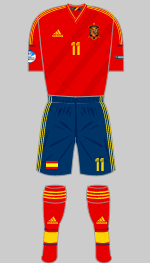
First
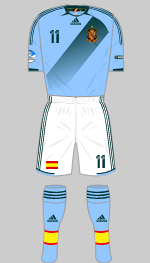
Second
Designer: Adidas
European and World champions, Spain are the team to beat, although their management has been emphasising that past success count for nothing. The new strip retains a traditional look but the shirt is now a darker red while navy shorts replace the light-ish blue worn in the World Cup. The legend on the inside reverse of the collar reads Campeones de Europa 1964 2008.
The brand new change strip in light and dark blue is a real head turner.
(Jon Forbes, Bjorn Toulouse)

 Italy
Italy
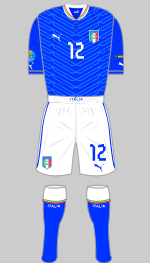
First
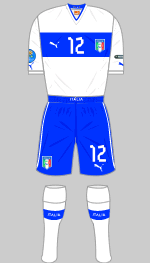
Second
Designer: Puma
Italy have reverted to their traditional look having worn all-blue in both the World Cup finals and the previous Euro competition. A complicated jacquard print is woven into the "home" shirt.
The second choice shirt has had a mixed reception in the UK but those with long memories will recognise it as a recreation of a classic from the mid-Sixties. The shorts are interchangeable.
 (Kevin Wos)
(Kevin Wos)
 Republic of Ireland
Republic of Ireland
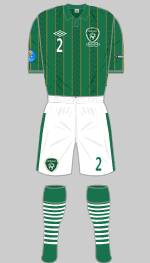
First
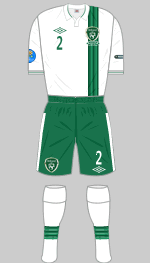
Second
Designer: Umbro
The FA of Ireland announced at the end of November that the current "home" kit would be retained for Euro 2012. The new change strip was launched in February and may be worn with the white home shorts if necessary.
 (Barry McDonnell, Arnold Smith, Wayne Tomlinson)
(Barry McDonnell, Arnold Smith, Wayne Tomlinson)
 Croatia
Croatia
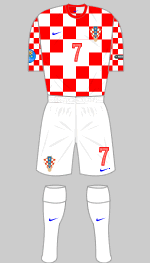
First
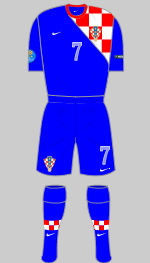
Second
Designer: Nike
Croatia's famous shirts are updated for the tournament, with smaller checks appearing on the sleeves and, for once, there is no blue in the first choice strip. The second strip is, however, mainly blue, as usual, with the checkered pattern at the left upper front of the shirt.
(Sytse Korts)
Group D
 Ukraine
Ukraine
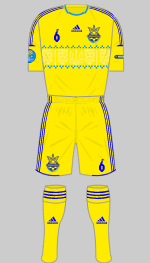
First
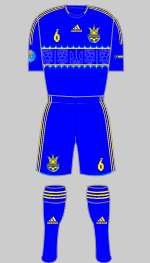
Second
Designer: Adidas
The co-hosts are, as usual, playing in yellow with royal blue trim but the new Adidas design has some neat touches. The trim at the collar and across the chest is in light blue (the shade used on the national flag) while patriotic symbols are printed into the fabric between the intricate horizontal bands. The main colours are simply reversed for the change strip.
(Conor Ritchie)
 Sweden
Sweden
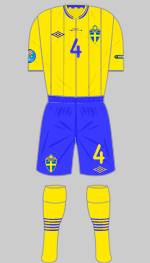
First
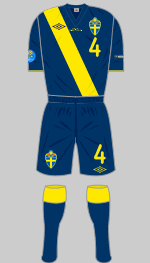
Second
Designer: Umbro
Sweden are one of the few national associations outside the British Isles to have a long-standing contract with Umbro, whose latest design for the Blågult (blue & gold) stays firmly with tradition while adding double pinstripes and a rather elegant collar to the shirt. The away strip was worn in the qualifying competition.
 (Ramazan Karsak, Greger Lindberg, Simon Ståål)
(Ramazan Karsak, Greger Lindberg, Simon Ståål)
 France
France
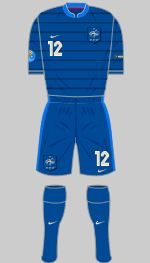
First
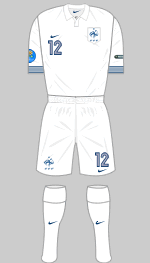
Second
Designer: Nike
Nike's popular marinière shirt is retired and in its place a an all-white change strip has been introduced. Trim is minimal, confined to six narrow dark blue bands on the sleeves while the shirt is manufactured from textured polyester fabric made from recycled plastic, as are the rest of Nike's Euro 2012 collection.
The new first choice strip departs from the traditional tricolour theme and is entirely blue, with pale gold used for the logos and fonts. The only red is in the ribbon sewn into the inside of the collar seam. Both strips have attracted much favourable comment.
 (Sytse Korts)
(Sytse Korts)
 England
England
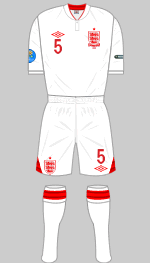
First
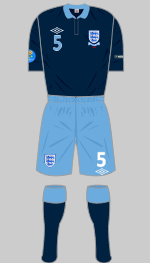
Second
Designer: Umbro
England are fortunate to have avoided the top teams in the group stages but after the debacle in South Africa, nothing should be taken for granted. Because they are based in western Poland, the team face long flights to all their group matches in Ukraine.
The radical new white "home" strip was launched in February and takes the flag of St George as it's inspiration. This is the first England strip ever that has no  blue in it at all.
blue in it at all.
Match by Match Reports: Group A | Group B | Group C | Group D | Knock-Out Stages
2008 | Euros Index | 2016
 For the first time the European Championship for national teams was played in Eastern Europe. The bid from Poland and Ukraine was chosen from a shortlist by UEFA's Executive Committee in April 2007 in Cardiff and is the third time in succession that a joint bid has been successful. Pending the outcome of trials of goal-line technology, UEFA placed two additional match officials alongside each goal.
For the first time the European Championship for national teams was played in Eastern Europe. The bid from Poland and Ukraine was chosen from a shortlist by UEFA's Executive Committee in April 2007 in Cardiff and is the third time in succession that a joint bid has been successful. Pending the outcome of trials of goal-line technology, UEFA placed two additional match officials alongside each goal. Poland
Poland

 Greece
Greece

 Russia
Russia

 Czech Republic
Czech Republic

 Netherlands
Netherlands

 Denmark
Denmark

 Germany
Germany

 Portugal
Portugal

 Spain
Spain

 Italy
Italy

 Republic of Ireland
Republic of Ireland

 Croatia
Croatia

 Ukraine
Ukraine

 Sweden
Sweden

 France
France

 England
England
